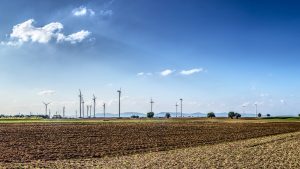 Onshore wind energy projects are necessary for a successful energy transition. IKEM proposes a special levy for wind farms aimed at securing acceptance engaging the surrounding municipalities.
Onshore wind energy projects are necessary for a successful energy transition. IKEM proposes a special levy for wind farms aimed at securing acceptance engaging the surrounding municipalities.
In 2017, more than 13 percent of power generation in Germany stemmed from onshore wind turbines. Additionally, almost three percent are generated offshore.[1] This makes wind energy the most important source of renewable energy today. But further efforts are needed, explains IKEM’s Managing Director Simon Schäfer-Stradowsky: “Our research clearly shows that we need a massive increase in wind power if Germany wants to meet its 2030 climate goals”. This is also reflected in the results of the current talks between the parties CDU/CSU and SPD, according to which the new federal government is planning special tenders for the construction of wind turbines with a total capacity of 4 gigawatts for 2019 and 2020.[2]
“The entire local population should benefit from wind energy in order to secure acceptance. This is crucial for the successful implementation of new projects and the completion of the energy transition”, adds Schäfer-Stradowsky. Apart from involving the public as early as possible in the planning process, direct financial participation of municipalities is a key strategy.
On behalf of Agora Energiewende, IKEM, in cooperation with the law firm Becker Büttner Held and the TU Berlin, Fachgebiet Wirtschafts- und Infrastrukturpolitik (WIP), analyzed how such a financial participation can be organized. Out of the different options, the introduction of a special levy seems most appropriate. “A financial contribution can increase the acceptance, if it is comprehensible and creates an actual benefit for the local communities”, says project manager Ralf Ott.
The special levy is calculated based on the height, the generation capacity and the electricity yield of the respective wind turbine – the operator would have to pay an annual fee in addition to a one-off payment at start-up. Because wind turbines are visible also from large distances, the fee should be distributed to all municipalities within a certain radius. Based on example values, a wind farm with three typical wind turbines will receive a one-off payment of 114,900 euros and 16,065 euros per year (see example calculation).
The special levy can be implemented nationwide in the Renewable Energy Sources Act (EEG). As part of the study, IKEM also drafted a legislative text for the introduction of the special levy. Schäfer-Stradowsky emphasizes: “The special levy is an ideal instrument for involving the local communities and for promoting wind energy.”
IKEM’s legal and economic analysis has now been published as part of the study “Wie weiter mit dem Ausbau der Windenergie” and is available for download on the website of Agora Energiewende. The study was written by Prof. Dr. Michael Rodi, Simon Schäfer-Stradowsky and Daniel Timmermann (all IKEM), Dr. Martin Altrock (BBH) as well as Ralf Ott, Albert Hoffrichter and Prof. Dr. Thorsten Beckers (WIP).
The study was based on preliminary considerations and research within the framework of the research project Dezentrale Beteiligung an der Planung und Finanzierung der Transformation des Energiesystems (DZ-ES) funded by the Federal Ministry of Education and Research. The research project was supervised by Prof. Dr. Thorsten Beckers, Technische Universität Berlin, Fachgebiet Wirtschafts- und Infrastrukturpolitik (WIP), and executed in collaboration with the Deutsches Forschungsinstitut für öffentliche Verwaltung Speyer (FÖV), Prof. Dr. Oscar W. Gabriel, the University of Greifswald, Prof. Dr. Michael Rodi and Becker Büttner Held Consulting AG (BBHC), Peter Bergmann.
Contact:
Simon Schäfer-Strdowsky
Magazinstraße 15-16 , 10179 Berlin
Tel. +49 (0)30 40 81 87 010
simon.schaefer-stradowsky@ikem.de
Ralf Ott
Straße des 17. Juni 135 (Raum H 4141a) , 10623 Berlin
Tel. +49 (0)30 314 75 838
ro@wip.tu-berlin.de
More Information:
Download Complete Study: LinkProject DZ-ES: Link
References:
[1] Agora Energiewende (2018): Die Energiewende im Stromsektor: Stand der Dinge 2017 (Download).
[2] Ergebnisse der Sondierungsgespräche von CDU, CSU und SPD. Finale Fassung vom 12.01.2018. (Download).







